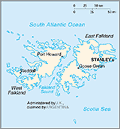This sparsely inhabited dependency consists of a group of islands in the South Atlantic, about 250 mi (402 km) east of the South American mainland. The largest islands are East Falkland and West Falkland. The English captain John Strong made the first recorded landing in the Falklands in 1690. The islands passed among the French, Spanish, and British until 1820, when the Argentine government proclaimed its sovereignty.
In 1833, a British force expelled the few remaining Argentine officials from the island without firing a shot, and in 1841 a British civilian lieutenant-governor was appointed for the Falklands. Colonial status was granted to the Falklands in 1892. Argentina, calling the islands Las Islas Malvinas, regularly protested Britain's occupation of the islands.
On April 2, 1982, Argentina's military government invaded the Falklands. The Falkland Islands war ended ten weeks later with the surrender of the Argentine forces at Stanley to British troops, who had forcibly reoccupied the islands. Argentina still claims the islands. But an agreement between Argentina and the United Kingdom in 1995 sought to defuse licensing and sovereignty conflicts that would dampen foreign interest in exploiting the Falkland Islands' potential oil reserves.
With 92% turnout, Falkland Islanders voted an overwhelming "yes" to the question: "Do you wish the Falkland Islands to retain their current political status as an Overseas Territory of the United Kingdom?" That referendum was held on March 9,2013. Argentina still claims sovereignty over the islands.


